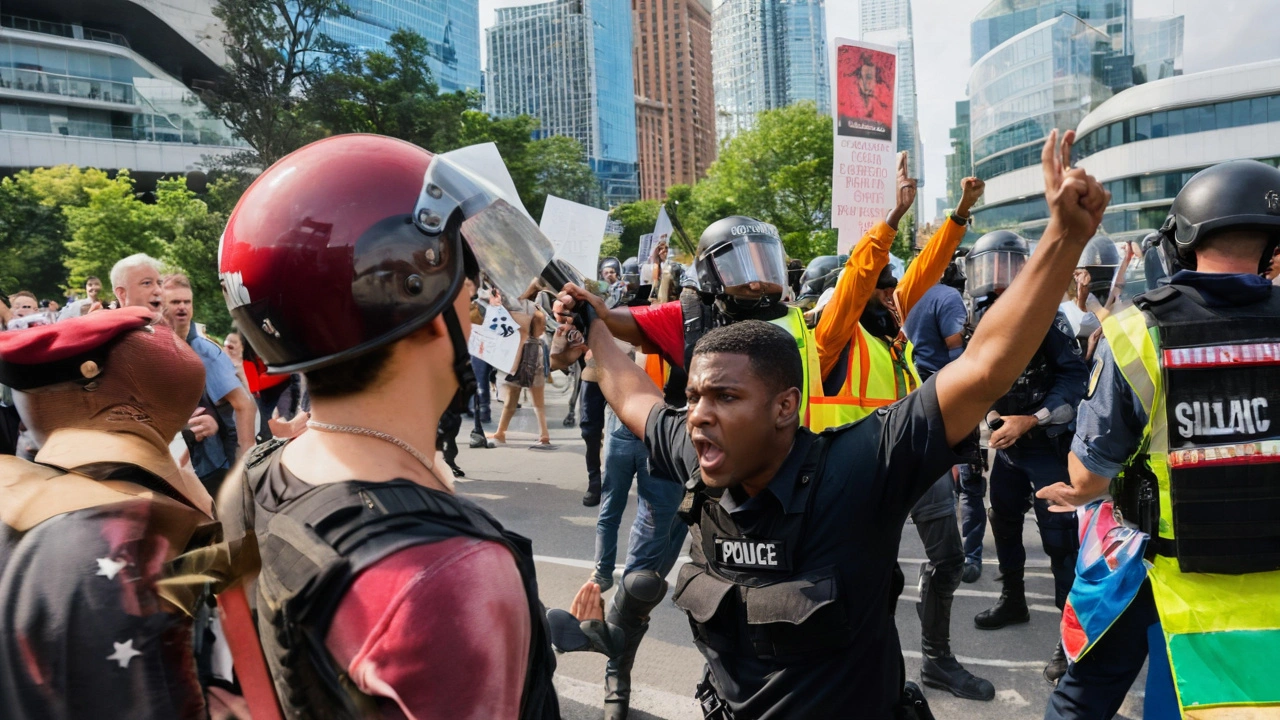Acting Inspector General Masengeli Urges Police to Adhere to Law Ahead of Nane Nane Demonstrations
As Kenya prepares for the anticipated Nane Nane demonstrations, Acting Inspector General of Police, Gilbert Masengeli, addressed members of the Police Service at a critical meeting. The session, held at the National Police Campus in Embakasi on Tuesday, August 6, emphasized the importance of law and order, specifically urging police officers to respect the legal frameworks governing public assembly, demonstrations, and picketing.
Importance of Adhering to Legal Frameworks
Masengeli underscored the critical role of law adherence among police officers, particularly in the context of handling public demonstrations. He reminded officers that every Kenyan has the constitutional right to demonstrate, assemble, and picket. This right is enshrined not just in the Kenyan Constitution but also governed under the Rome Statute, setting a clear mandate for law enforcement to facilitate, rather than hinder, these democratic expressions.
Referring to the Nane Nane demonstrations slated for Thursday, August 8, Masengeli stressed the importance of police restraint and due process. His directive to plainclothes officers to always identify themselves when asked struck a chord in addressing past concerns of unaccountable law enforcement actions. Transparency from the police was highlighted as a key factor in maintaining public trust and ensuring peaceful demonstrations.
Challenges with Emerging Crimes
Beyond the immediate focus on Nane Nane, Masengeli expanded on the evolving landscape of crime in Kenya. He pointed to rising issues such as cybercrime, terrorism, violent extremism, and banditry, which pose significant challenges to national security. The message was clear: innovation and adaptability are crucial for the police to stay ahead of these emerging threats.
Masengeli acknowledged the distinctiveness of Gen Z's social and political engagements, urging police officers to differentiate between genuine protesters and opportunistic elements who exploit such events for criminal activities. This nuanced understanding is pivotal in preventing undue violence and property destruction during protests.
Collaborative Efforts for National Security
Highlighting collaboration within the criminal justice system, Masengeli cited the judiciary, the Office of the Director of Public Prosecutions (ODPP), and Prisons as indispensable partners for a holistic approach to security. Such cooperative efforts would fortify the National Police Service’s (NPS) ability to address contemporary security challenges effectively.
Economic Implications and Regulatory Measures
During this ongoing discourse on public security, Foreign Affairs Principal Secretary Korir Sing’oei also voiced concerns. Conveyed through his X-Account, Sing’oei emphasized the economic drawbacks of unregulated protests, particularly their impact on the private sector. Citing the economic instability caused by frequent mass protests, he advocated for stricter regulation to curtail violent and chaotic demonstrations, framing it as vital for long-term economic health.
Sing’oei's stance draws attention to the broader economic implications of public disturbances. He argued that protesters often do not internalize the economic costs of their actions, which are instead transferred to private entities. This perspective likened violent protests to public nuisances such as pollution, warranting government intervention to prevent substantial economic and social costs.
Human Rights and Public Cooperation
Simultaneously addressing human rights and public cooperation, Masengeli reiterated that violent protesters engaging in criminal activities would face stringent legal repercussions. This balancing act—safeguarding lawful protests while deterring criminal disruptions—requires robust public cooperation and transparency from law enforcement.
As Kenya navigates these complex socio-political terrains, the upcoming Nane Nane demonstrations will be a crucial test. The extent to which the police and public adhere to the principles of lawful and peaceful demonstration will underscore the maturity of Kenya's democratic processes and the efficacy of its security apparatus in maintaining public order.
Looking Forward
In conclusion, the directives from Acting IG Masengeli and the calls for regulation from PS Sing’oei collectively highlight the multifaceted approach necessary for addressing the challenges posed by public demonstrations. Combining legal adherence, innovation in crime prevention, and economic considerations, Kenya's leadership underscores the importance of a balanced, law-abiding, and cooperative societal framework.







Madison Neal
The directive underscores the necessity of procedural compliance, emphasizing that every operational unit must internalize constitutional mandates. By invoking the Rome Statute, the briefing adds an international dimension to local law enforcement standards. This multilayered legal framework demands that officers integrate human rights protocols into their tactical playbooks. The call for plain‑clothes officers to identify themselves directly addresses past accountability gaps. Ultimately, the emphasis on transparency aims to bolster public confidence in the policing enterprise.
John Crulz
Balancing the imperatives of public safety with the constitutional right to assemble is a delicate act, yet it is essential for a healthy democracy. The brief highlighted that while cybercrime and terrorism present modern challenges, they should not eclipse the protection of peaceful protest. Clear identification by law enforcement can mitigate misunderstandings and reduce the potential for escalation. When officers are visible and accountable, communities are more likely to cooperate during high‑tension events. This synergy between security and civil liberties should be the benchmark for future operations.
Anita Drake
The inclusive tone of the briefing resonates strongly with Kenya’s diverse cultural tapestry. By acknowledging the generational dynamics of Gen Z, the IG encourages a nuanced approach that respects youthful activism while safeguarding public order. Collaborative partnerships with the judiciary and the ODPP are vital to ensuring that any infringement on rights is legally sound. Emphasizing economic considerations alongside human rights creates a balanced narrative that can guide policy. Ultimately, fostering dialogue between protesters and police will strengthen societal cohesion.
Eduardo Lopez
The emphasis on restraint is commendable, yet it must translate into concrete operational changes on the ground. Officers who conceal their identities undermine the very transparency the IG championed, feeding distrust among citizens. When amnesty is perceived as selective, it fuels the drama of public dissent, turning peaceful rallies into spectacles of confrontation. It is crucial that the force internalizes the legal frameworks discussed, otherwise rhetoric remains just that-empty words. Moreover, the rise of cyber‑enabled threats should not become a blanket justification for cracking down on lawful assemblies. A calibrated response, guided by clear protocols, can preempt the infiltration of opportunistic elements without stifling genuine grievances. By aligning enforcement with constitutional guarantees, the police can demonstrate both authority and legitimacy.
Nancy Perez de Lezama
The police need to wear visible badges.
Matt Heitz
The sanctity of the Kenyan Constitution cannot be overstated.
Every citizen is endowed with the inviolable right to peaceful assembly, a principle that the state must protect with unwavering dedication.
Law enforcement agencies are mandated to operationalize this right through transparent protocols that leave no room for arbitrary force.
When officers don plainclothes attire without proper identification, they erode public trust and contravene established legal standards.
Such practices not only violate procedural safeguards but also expose the force to accusations of abuse.
The recent emphasis on cybercrime and terrorism, while legitimate, must not become a pretext for suppressing legitimate dissent.
A balanced security posture requires calibrated responses that differentiate between criminal activity and lawful protest.
The judiciary, the ODPP, and correctional services, as highlighted by IG Masengeli, should act as checks and balances to any overreach.
Economic arguments presented by the foreign affairs secretary, though noteworthy, should not obscure the fundamental human rights at stake.
Unregulated protests are not synonymous with chaos; rather they are expressions of democratic engagement that need proper facilitation.
The police must adopt a community policing model that integrates stakeholder feedback to preempt tensions.
Training modules on de‑escalation and rights awareness should be institutionalized across all ranks.
Transparency in operational directives, including clear identification badges, fosters legitimacy.
Ultimately, the health of Kenya's democracy hinges on respecting the rule of law while proactively safeguarding citizens from genuine threats.
Only through this calibrated approach can Kenya achieve both security and liberty in tandem.
Susan Mark
It's encouraging to see such a comprehensive call for balanced policing.
Community‑based dialogue can serve as a practical bridge between law enforcement and protesters, diffusing tension before it escalates.
Providing clear identification and transparent procedures will likely improve public trust and cooperation.
Ultimately, these steps could set a strong precedent for future demonstrations across the region.